Image by Freepik
Context
This survey was initiated as a result of discussions which took part in Bridges for Trainers in March 2023. A number of trainers from the International Youth Work Trainers Guild and some non-members drafted a survey, consulted with the field on the questions and then launched consultations in May-June.
Here is the summary of the insights collected through the consultation process with trainers on the way they see trainers’ roles and experiences in Erasmus+ programme from 2020 until now.
Summary
Clarity of the Trainer’s Role in Erasmus+:
Respondents sought a clear definition of the trainer’s role in the Erasmus+ Programme, particularly in the youth field. They expressed that the term “trainer” should not be too broadly used and emphasised the importance of defining the roles, responsibilities, and quality expectations for trainers.
Budget Structure & Quality Conditions:
The financial aspect was a significant concern among respondents. They highlighted the need for:
– A separate budget line dedicated specifically to trainers, covering not just the training activities but also the preparation and follow-up.
– Financial adjustments that consider the virtual components in the funding.
– Standardised daily rates for trainers and specific budgetary support for items like professional travel insurance and self-improvement vouchers for trainers.
Erasmus+ Architecture & Quality of Training Activities:
Trainers expressed concerns about the overall structure of the Erasmus+ programme. They touched upon the need for transparent partnerships and clear contractual agreements. The notion of an “AirBnB of trainers and trainings” was introduced, where organisations, trainers, and participants could be rated, ensuring quality assurance.
Cooperation with National Agencies & SALTO Resource Centres:
Feedback indicated mixed feelings. While some trainers appreciated the opportunities provided, others felt there was a lack of support and recognition, with concerns about nepotism and unequal treatment between different Erasmus+ activities.
Cooperation with Accredited Organisations (NGO, Associations):
There were calls for more work opportunities for trainers, with better pay, protection against unreasonable competition, and clearer guidelines. Some respondents emphasised the potential of technological innovations, such as chatbots, in training.
Protection in Force Majeure Situations:
Trainers felt unprotected during unexpected events like the pandemic. They expressed that they often faced cancellations without compensation and lacked financial security in such situations.
Several other challenges were highlighted:
– The absence of an inclusive platform to recognise and rate the work of trainers.
– The need for more mentoring and coaching opportunities and research on the importance of trainers in youth work.
– The lack of technological integration in training.
– Calls for safeguarding measures, professional standards, and equality practices.
The feedback received through this mid-term evaluation process points towards the need for clearer guidelines, financial support, recognition, and opportunities for professional development for trainers in the Erasmus+ Programme.
Now let’s explore more details on responses received for each question.
Demographics of survey respondents
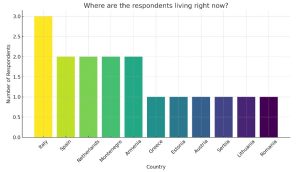
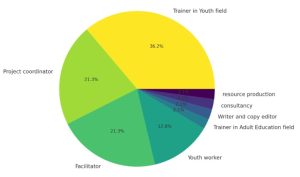
The chart illustrates the distribution of roles among the respondents. We can see that “Trainer in Youth field” is the most common role, followed by “Facilitator”, “Project coordinator”, and “Youth worker”. The other roles, such as “Trainer in Adult Education field”, “Writer and copy editor”, “consultancy”, and “resource production”, have a smaller representation.
Note that because some respondents identified with multiple roles, the sum of all percentages may exceed 100%.
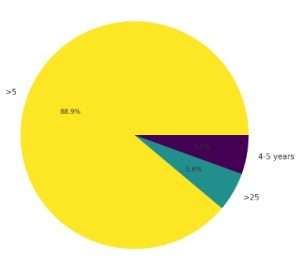
The vast majority of respondents have more than 5 years of experience, while a small percentage have 4-5 years of experience. Interestingly, one respondent reported having more than 25 years of experience.
Clarity of the role of the trainer in the Erasmus+ Programme, youth field

The chart shows that respondents’ perceptions vary quite a bit. Some found the role perfectly clear, while others did not find it clear at all. A significant number of respondents rated the clarity at levels 2, 3, and 4. This suggests that there is room for improvement in terms of making the role of the trainer clearer in the Erasmus+ Programme.
Based on the comments we received, here is a summarised analysis clustered around the main themes mentioned:
- Lack of Clear Definition or Recognition of Trainer Role (12 responses): Respondents highlighted that there’s no clear description of the trainer role in the Erasmus+ Programme guide. Some comments indicated that anyone can self-proclaim themselves as a trainer, leading to misconceptions around the role. A specific example was given of people facilitating youth exchanges identifying themselves as trainers. The lack of a dedicated budget line for trainers was also mentioned as a sign of unclear recognition. The metaphor of “Schrodinger’s cat” was used to illustrate this ambiguity.
- Financial and Quality Concerns (4 responses): A few comments referred to financial aspects, such as the absence of dedicated funds and budget items for trainers and the lack of clarity around honorarium. Respondents also voiced concerns about people training in subjects they know little about, indicating a potential issue with quality control.
- Comparisons to Other Roles and Programs (3 responses): Some respondents suggested that the role of a trainer could be better defined, similar to how a coach or mentor is described. There were also comparisons to other programs and national differences in applying for funding, with one respondent noting a higher risk of applications not being approved in the Netherlands if the target group is trainers.
- Recognition and Professionalism (3 responses): A few respondents noted the need for trainers to be recognised as valuable contributors to the field, especially given their essential role in ensuring quality. They indicated that the decision-making process is often driven by individuals without a professional background in youth work or non-formal education, rather than by the trainers themselves.
- Need for Improvement and Evolution (2 responses): Some comments highlighted positive aspects, such as the existence of a European Training Strategy and support offers for trainers. However, these respondents also called for improvements, including better quality control, recognition, job opportunities, and more coherent selection procedures for trainers.
- Existence of a Framework (1 response): One respondent mentioned the existence of a framework, though they didn’t elaborate further.
Overall, the main concerns are the lack of a clear definition and financial recognition for the role of trainers in the Erasmus+ Programme, along with quality control issues and variations in national application processes.
Respondents also expressed a desire for trainers to be more involved in shaping the program and for more formal recognition of their contributions.
What do you think would make it clearer?
Here is the summary of major comments:
- Defining the Trainer Role (9 responses): Respondents suggested that adding a clear definition or description of the trainer role in the Erasmus+ Guide would help, including details on roles, responsibilities, and quality expectations. This could help ensure that the term “trainer” is not used inappropriately or too broadly.
- Financial Recognition and Professional Development (7 responses): Comments indicated a desire for a specific funding line for trainers in the application process, with minimum and maximum fees suggested. Some respondents called for a minimum daily honorarium and clear rules for engagement, while others highlighted the need for resources for preparation meetings and tasks. The idea of making the trainer’s professional background an important assessment criterion was also proposed.
- Certification and Quality Control (5 responses): Several respondents mentioned the idea of certification or professional recognition for trainers. Suggestions included the creation of an advisory board of trainers to help inform and shape quality requirements, as well as the establishment of transparent and coherent selection criteria and procedures. There were also calls for quality monitoring and an EU-level standardisation of contract features.
- Continuing Education and Training (3 responses): A few comments emphasised the importance of ongoing professional development for trainers. These respondents suggested that trainers themselves should be recognised as learners who require continuous training.
- Improved Communication and Recognition (2 responses): Some respondents suggested that trainers should be viewed as creators rather than consumers or customers, indicating a desire for greater recognition of their contributions. The idea of clearer communication, including in application forms and evaluation processes, was also mentioned.
- Satisfaction with Current Clarity (2 responses): A couple of respondents indicated that they find the current situation clear or that no changes are needed.
People generally called for a clearer definition of the trainer role, financial recognition, certification or professional recognition, opportunities for continuing education, and improved communication. These changes could help ensure quality control, professional development, and a greater sense of recognition and respect for trainers’ contributions.
How well does the budget structure support quality conditions for the trainer’s work?
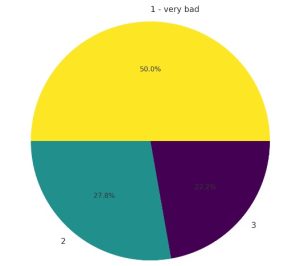
The majority of respondents rated it as “1 – very bad”, suggesting significant dissatisfaction with the current budget structure. The rest of the responses were spread between ratings “2-quite bad” and “3-fair”, with no respondents rating it as “4-good” or “5 – very good”. This indicates a perceived need for improvements in the budget structure to support better the quality of trainers’ work in the Erasmus+ Programme.
Here is the summary of comments received from the responders.
- Lack of Dedicated Budget for Trainers (9 responses): Respondents expressed frustration that there’s no specific budget line allocated for trainers. They noted that this often leads organisations to become “creative” with their budgeting, sometimes at the expense of quality in other areas such as accommodation and food. Some suggested that a clear, recommended wage set by the European Commission could alleviate this issue.
- Inconsistencies and Inequities in Funding (5 responses): Comments highlighted perceived inconsistencies in funding amounts across sectors and countries. Respondents pointed out that individual and organisational support in other sectors, such as higher education, is often higher than in the youth sector. Additionally, some mentioned that travel amounts are not in line with reality, particularly for green travel.
- Bureaucracy and Time Constraints (4 responses): Some respondents noted that they spend more time dealing with bureaucracy and reporting than delivering training. They mentioned that they often have to work more hours than the budget allows to deliver a quality training. One respondent suggested that including budget for trainers in terms of accommodation, food, travel, and service fees in the application form could improve the budget structure.
- Quality and Professional Development (4 responses): Several comments highlighted the impact of the budget structure on the quality of training and the development of trainers. Respondents noted that the lack of a dedicated budget for trainers puts fees in direct competition with other expenses and can lead to less experienced or less competent individuals delivering training. Additionally, one comment pointed out that the current budget structure does not provide for the development of methodological outputs, training resources, digital content, or online learning activities.
- Impact of Inflation and Cost of Living (2 responses): A couple of respondents mentioned that the budget has remained largely the same over the years, without adequate adjustments for inflation or increases in living standards. They suggested that this reflects a lack of consideration for quality in the budgeting process.
Overall, respondents identified a lack of a dedicated budget for trainers, inconsistencies and inequities in funding, bureaucratic hurdles, and inadequate consideration of quality and professional development as key issues with the current budget structure. They suggested various improvements, including the introduction of a clear, recommended wage for trainers, adjustments for inflation and cost of living, and budgeting for professional development resources and activities.
Architecture of Erasmus+ and Quality of Training
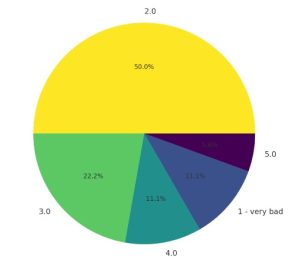
The chart shows that respondents’ views are distributed across the scale from “1 – very bad” to “5 – very good”. The most common response was “2”, suggesting that most respondents believe there is room for improvement. This data indicates a need for potential enhancements in the Erasmus+ program’s architecture to better support the quality of training activities in Europe.
Based on the comments provided, here is a summarised analysis, clustered around the main themes mentioned:
- Complexity and Time Consumption (4 responses): Several respondents noted that the application process and program structure are complex and time-consuming. While some acknowledge that this can lead to improved project management and reduced number of poorly managed projects, others indicate that it makes it uninteresting to invest time in.
- Inconsistency and Discrimination (3 responses): A few comments pointed out perceived inconsistencies and discriminatory aspects in the program. Some respondents mentioned that the rules and fees appear to vary, with trainers treated differently based on perception. One respondent specifically mentioned the program being difficult to understand for people with ADHD, suggesting it is discriminatory.
- Lack of Quality Focus (3 responses): Some respondents expressed the view that the program focuses heavily on practical arrangements and management aspects, with little attention to content quality. They suggested that the program lacks opportunities for repeating training concepts for perfection and does not adequately support external assessment of competence development and learning achievements.
- Lack of Structural Support (3 responses): Comments highlighted the lack of structural funding for networks and the need for opportunities to implement paid job shadowing, internships, and apprenticeships during training implementation. Respondents also mentioned the absence of opportunities for structured dialogue between trainers, training organisations, and policy/ decision makers.
- Contractual Issues (2 responses): A couple of respondents pointed out that contracts often lack features connected with quality in training activities and the professional development of trainers. They suggested that trainers are often not involved in every step of a project, which impacts the quality of training.
- Satisfaction with Current Structure (1 response): One respondent expressed satisfaction with the current program structure, indicating that it brings quality to training.
While some respondents appreciate aspects of the Erasmus+ program, many raised concerns about its complexity, perceived inconsistencies, focus on management over quality, and lack of structural support for trainers and networks.
Suggestions for improvement included simplifying the application process, standardising rules and fees, increasing focus on content quality, and providing structural funding and opportunities for professional development.
Cooperation and working conditions of training activities organised by National Agencies and SALTO Recourse centres
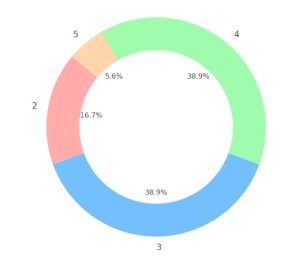
Here is the summary of comments:
- Several respondents (6) noted variability in their experience working with different National Agencies and SALTO Resource Centres. Some mentioned positive experiences, describing clear contracts and fair cooperation, while others mentioned issues such as nepotism, top-down approaches, and a lack of understanding of international youth work realities.
- A few respondents (3) emphasised the need for improved communication and transparency. They suggested that the application and selection processes could be more transparent and that better communication is needed between trainers and National Agencies.
- Three respondents mentioned the impact of the COVID-19 pandemic on the working conditions. They described a loss of capacity among the National Agencies, leading to challenges in organising and understanding international youth work realities. They also noted difficulties arising from public tender procedures not being suitable for their field.
- Two respondents discussed financial and contractual conditions. They mentioned issues such as delayed contract issuance and late reimbursement of travel costs, suggesting that these factors make the field insecure.
- One respondent mentioned a need for improved support for diversity and dietary needs in the logistics of organising international non-formal learning training formats.
- One respondent expressed satisfaction with the working conditions, describing the roles as clear and the salaries as quite good.
How do you perceive cooperation and working conditions in relation to activities organised by accredited organization (NGO, associations, etc.)
Here’s a summary of comments:
Financial and contractual concerns (4 comments): Several respondents emphasised challenges related to financial conditions and contracts. They mentioned issues such as the absence of clear contracts, the process of negotiating fees, and other related financial concerns.
Quality of cooperation (7 comments): A noticeable number of respondents discussed the quality of cooperation with accredited organisations. This includes instances where they felt undervalued, unsupported, or where their expertise as trainers wasn’t fully recognised.
Diverse experiences (2 comments): A couple of respondents pointed out that their experiences varied significantly depending on the specific organisation they were working with.
Bureaucracy and administrative challenges (1 comment): One respondent highlighted the burden of administrative tasks and bureaucracy, indicating that it detracted from the primary focus of training delivery.
Positive aspects (2 comments): Despite the challenges, some respondents had positive experiences, mentioning instances where organisations were clear, supportive, and valued their contributions.
Protection in Force Majeure situations (pandemic, war, etc.)

1 : 61.1% of respondents feel they have the lowest level of protection.
2: 5.6% of respondents feel they have a slightly better, but still low, level of protection.
3: 27.8% of respondents feel they have a moderate level of protection.
4: 5.6% of respondents feel they have a higher level of protection.
No one felt really safe in the case of Force Majeure situation.
COVID-19 Impact: A few respondents highlighted the pandemic as a revealing point for the lack of protection. Comments such as “COVID showed us we have no protection” and “It already happened with COVID when trainings were just cancelled and trainers were left with no jobs and no money” indicate a sentiment of vulnerability during the pandemic.
Contractual Issues: The importance of solid contracts and reliable partners was mentioned. One respondent shared a negative experience of being underpaid by 1000 euros compared to the agreed contract.
National Agencies (NAs) and NGOs: Some responses mentioned the challenges posed by addendums and limited support from NAs, making it tough for NGOs to provide support in adverse situations. The inconsistency in the treatment by the same NA in different scenarios was also highlighted.
Uncertainty and Inconsistency: Several respondents expressed uncertainty about the processes in place for Force Majeure situations. One comment mentioned that before COVID-19, there was uncertainty about the existence of protective measures, and during the pandemic, the measures seemed inconsistent.
Systemic Changes Needed: Some respondents expressed the need for a more coherent and universally applied system to protect trainers. There were concerns about the sustainability of protection measures, especially when contractors aren’t NAs.
Experience and History: A few trainers drew from their extensive experience, indicating that historically, there hasn’t been much protection. For instance, one respondent with over 25 years of experience mentioned that adequate consideration for such situations was rare.
Improvements and Positives: Despite the predominant sentiment of vulnerability, some comments hinted at improvements. One respondent mentioned that things have become clearer since 2020, especially for TCA activities, while another noted increased flexibility during adverse events.
What were other challenges (not mentioned previously) for you as a trainer in relation to the structure and implementation of the Erasmus+?
Recognition of trainer’s work:
– One respondent pointed out that their work is only recognised within a specific network and through word of mouth.
– Another mentioned the lack of financial recognition for preparation and extreme working hours during events.
– The importance of quality and its seeming neglect in reporting was highlighted. The emphasis is often on quantitative aspects, affecting budget decisions.
Financial Concerns and Budgeting:
– Several comments revolved around financial concerns. For instance, the inability to adjust fees in line with inflation, and the fact that travel time/days often aren’t paid were mentioned.
– There’s a lack of financial support for virtual activities within KA1 outside of the pandemic context.
– Some pointed out disparities in budgeting, such as differences in budget for NA trainings compared to NGO-led initiatives.
– The budget caps on travel often result in inconvenient and lengthy travel times, with associated risks.
Operational Challenges:
– Reporting in the Beneficiary Mobility Tool (BM) is perceived as a consistent challenge, leading organisations to spend more time on administrative tasks.
– Different legal requirements by different contractors, especially related to taxes and required fiscal documents, were highlighted as challenging.
– Some respondents felt there’s a neglect of digital transformation in the field, with a call for more support for online/blended/hybrid learning formats.
– There’s a perceived lack of authentic collaboration and partnership.
Professional Development and Welfare:
– The lack of welfare recognition, such as personal insurance in case of accidents, was noted.
– There’s a need for more opportunities for continuous professional growth for freelance trainers.
– The process of applying for extra budget, especially for participants with special needs, is viewed as invasive, requiring trainers to breach trust by disclosing personal information.
Perception and Culture:
– Nepotism and a spirit of unhealthy competition among trainers were pointed out.
– The emphasis on not having similar text across multiple projects was criticised, especially when many questions are management-related.
– The evaluation of training projects varies significantly between countries, even though the criteria are the same.
And finally, we asked trainers to share what would they like to see in the future programme? (In relation to trainers and training activities)
Based on the responses provided, the comments can be grouped into several main categories. Here’s a summary of the feedback given by the respondents regarding what they would like to see in the future programme for trainers and training activities:
Recognition and Clarity of Role:
– Several respondents emphasised the need for explicit recognition of the importance of the trainer role in activities.
– They called for clarity about the role of the trainer and the establishment of quality criteria for the trainer’s profile and work.
Financial Support and Budgeting:
– There’s a strong call for a separate budget line specifically dedicated to trainers. This budget would not only cover the actual training activities but also preparation and follow-up.
– Respondents highlighted the need for financial adjustments, including the consideration of virtual components in funding.
– Some respondents expressed a desire for standardised daily rates for trainers, similar to existing structures in SALTO.
– There were suggestions for specific budgetary support for items like professional travel insurance and self-improvement vouchers for trainers.
Quality Assurance and Professional Development:
– One respondent introduced the idea of an “AirBnB of trainers and trainings”, where organisations, trainers, and participants could be rated, contributing to quality assurance in the field.
– There’s a call for more mentoring and coaching opportunities for trainers and research to highlight the importance of trainers in youth work.
– Some respondents pointed out the need for technology integration in training and the inclusion of new topics related to technology.
Equal Opportunities and Fair Practices:
– There’s a desire for more equal working terms across different Erasmus+ activities, ensuring fairness and consistency.
– Respondents expressed a wish for more work opportunities as trainers, with better pay and protection against unreasonable competition.
Innovations and Improvements:
– Respondents suggested the possibility of preparatory meetings for trainers, with dedicated budgets for thorough planning.
– They highlighted the potential of embedding technological innovations in trainings, citing tools like chatbots as examples.
– There were calls for safeguarding measures, professional standards, and equality practices to be established and adhered to.
This survey has been prepared and summarised by the members of the International Youth Work Trainers Guild



